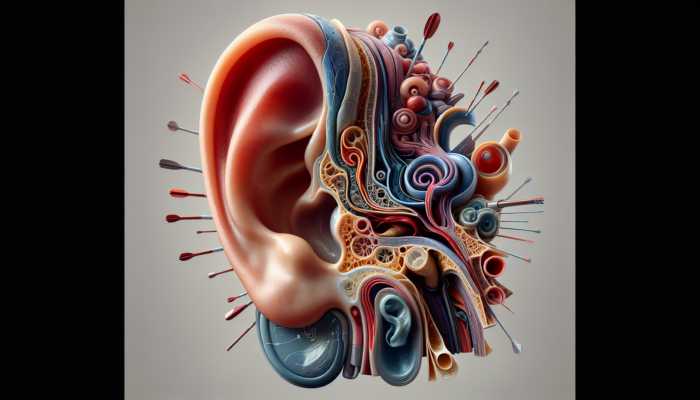Last Updated on 25/11/2025 by Admin
Comprehensive Guide to Conductive Hearing Loss
Identifying the Key Causes of Conductive Hearing Loss
Conductive hearing loss occurs when sound waves cannot efficiently travel through the outer ear canal to the eardrum and the small bones located in the middle ear. Common reasons for this condition include earwax buildup, which can obstruct the ear canal, and the presence of fluid in the middle ear, frequently resulting from allergies or infections. Additionally, damaged eardrums can impede sound transmission, as can conditions like ossicular chain discontinuity, where the tiny bones in the middle ear fail to function properly. Other contributing factors may involve malformations of the outer or middle ear and tumors that obstruct the pathways necessary for sound. Identifying these causes is crucial for effective treatment, as many can be resolved through medical intervention or surgical procedures.
Long-term exposure to untreated conductive hearing loss can have profound effects on individuals, often leading to social withdrawal and communication difficulties, which ultimately diminishes their quality of life. Understanding the underlying causes is essential for implementing both preventative and responsive healthcare strategies. For instance, individuals experiencing ear pain or pressure, especially if they notice temporary hearing loss, should seek prompt medical evaluation to identify any potential fluid accumulation or blockages that may be present.
Recognizing the Symptoms of Conductive Hearing Loss
Identifying the symptoms of conductive hearing loss at an early stage can greatly enhance the management and treatment outcomes for affected individuals. Common symptoms include muffled hearing, where sounds may appear soft or unclear, and a sensation of fullness or pressure in the ear, which can cause discomfort. Patients may also experience ear pain, often associated with infections that contribute to conductive loss. Furthermore, individuals may notice a decreased ability to hear faint sounds or an overall reduction in hearing thresholds, making it challenging to follow conversations, particularly in noisy environments.
Early detection of these symptoms can lead to timely interventions that may restore hearing function significantly. For example, promptly removing earwax or treating ear infections often results in substantial improvements in hearing. Since conductive hearing loss can sometimes be mistaken for other conditions, individuals should remain vigilant in monitoring their ear health. Awareness of the symptoms empowers patients to proactively seek medical advice, thereby reducing the long-term impact of the condition.
Exploring Treatment Options for Conductive Hearing Loss
The treatment options available for conductive hearing loss are varied and frequently depend on the specific underlying cause of the disturbance. For cases involving earwax buildup, simple procedures like ear irrigation or manual removal by a healthcare professional can quickly restore hearing functions. In instances where fluid accumulation is the issue, healthcare providers may prescribe antibiotics or recommend decongestants to alleviate symptoms and resolve the problem. In chronic situations, especially those with recurrent ear infections, tympanostomy tubes may be necessary to ventilate the middle ear and prevent fluid accumulation effectively.
In cases where the eardrum is perforated or the ossicular chain is disrupted, surgical intervention may become necessary. For some patients, the use of hearing aids designed to amplify sound can effectively manage the condition, particularly when physical blockages remain surgically uncorrectable. It is vital for patients to engage in open discussions with their healthcare providers about these options, as treatment paths may differ based on individual circumstances and specific medical histories. Recognizing these treatment modalities fosters improved patient compliance and satisfaction with their hearing health management.
In-Depth Overview of Sensorineural Hearing Loss
Understanding the Causes of Sensorineural Hearing Loss
Sensorineural hearing loss primarily results from damage to the inner ear or the auditory nerve, significantly affecting how sound signals are transmitted to the brain. Common causes include aging, referred to as presbycusis, where the delicate hair cells in the cochlea deteriorate over time. Additionally, noise exposure, particularly in high-decibel environments, can lead to irreversible damage. Certain diseases, such as meningitis or Meniere’s disease, can impact inner ear functionality, while ototoxic medications may cause lasting harm to the auditory system.
In many instances, the exact reason for sensorineural hearing loss may be difficult to discern, but factors like genetic predisposition also play a significant role in susceptibility. Understanding these causes is crucial for developing effective prevention and management strategies, including public health initiatives aimed at reducing noise exposure in urban settings or workplaces. As awareness increases, individuals become more empowered to take proactive steps in safeguarding their hearing health throughout their lives.
Identifying the Symptoms of Sensorineural Hearing Loss
The symptoms of sensorineural hearing loss can be particularly challenging to recognize, as they often develop gradually, leading individuals to overlook their significance initially. Common indicators include difficulty understanding speech, especially against background noise, which creates frustrating communication barriers. Many individuals also report experiencing tinnitus, or ringing in the ears, which can vary in intensity and frequency, further complicating the hearing experience. Additionally, patients may feel a fullness in the ear, similar to that experienced with conductive hearing loss, but the underlying reasons differ.
Identifying these symptoms early on is crucial, as timely intervention can significantly impact management and potential recovery. Hearing loss can range in severity from mild to profound, and understanding these variations helps individuals seek appropriate evaluations and treatments tailored to their specific needs. Awareness of symptoms empowers patients to engage actively in their healthcare, fostering dialogues that lead to better support and treatment outcomes.
Examining Treatment Options for Sensorineural Hearing Loss
Managing sensorineural hearing loss often requires a multifaceted approach, which may include the use of hearing aids or cochlear implants, particularly in cases of profound loss. Hearing aids amplify sounds to assist those with mild to moderate hearing loss, while cochlear implants can directly stimulate the auditory nerve in more severe instances. The appropriate choice of treatment depends on the degree of hearing loss, the patient’s lifestyle, and their specific auditory needs.
Additionally, certain medications may help treat underlying conditions contributing to hearing loss, such as corticosteroids for sudden sensorineural hearing loss. Regular consultations with audiologists and otolaryngologists are essential for monitoring and adjusting treatment plans based on patient progress and satisfaction. Educational resources and support groups also play a significant role in helping patients adapt to their conditions, providing strategies and emotional support for individuals and families affected by hearing loss.
Understanding the Impact of Sensorineural Hearing Loss on Daily Life
Sensorineural hearing loss can significantly affect various aspects of daily life, particularly in communication and social interactions. Individuals may find it increasingly difficult to engage in conversations, which can lead to feelings of isolation and frustration. The emotional toll can manifest as anxiety or depression, creating a cycle where individuals withdraw from social situations, further exacerbating their sense of loneliness. Moreover, the cognitive effects of untreated hearing loss are well-documented, revealing connections between auditory impairment and cognitive decline.
Recognizing the broader implications of sensorineural hearing loss underscores the importance of early detection and intervention. Supportive environments, whether at home, in social settings, or workplaces, can enhance communication and improve overall quality of life. Implementing strategies such as clear speech, maintaining eye contact during conversations, and utilizing assistive listening devices can facilitate more effective interactions. Establishing comprehensive support systems for individuals experiencing hearing loss fosters resilience and a sense of community, ultimately benefiting overall well-being.
What Are the Key Differences Between Conductive and Sensorineural Hearing Loss?
Understanding Differences in Causes
The differences in the causes of conductive and sensorineural hearing loss are fundamental to understanding the nature of each condition. Conductive hearing loss primarily affects the outer or middle ear, where issues such as earwax blockage or fluid accumulation inhibit sound transmission. In contrast, sensorineural hearing loss involves the inner ear or auditory nerve, where damage may arise from factors such as aging, exposure to loud noises, or specific diseases.
Recognizing these differences can aid in accurate diagnosis and treatment. Common causes of conductive hearing loss include:
- Earwax buildup
- Fluid in the middle ear
- Perforated eardrum
- Ossicular chain dysfunction
Conversely, the causes of sensorineural hearing loss often include:
- Aging (presbycusis)
- Noise-induced damage
- Ototoxic medications
- Certain genetic conditions
Understanding these distinctions not only informs treatment strategies but also educates individuals about their hearing health and the significance of timely medical evaluations.
Recognizing Differences in Symptoms
The symptoms of conductive versus sensorineural hearing loss manifest differently, providing key insights for diagnosis. Conductive hearing loss often leads to muffled hearing, where sounds are perceived as indistinct or soft. Patients may also experience sensations of ear fullness and pain, typically linked to physical blockages. In contrast, sensorineural hearing loss tends to produce more complex symptoms, including difficulty understanding speech, especially in noisy environments, and the presence of tinnitus, which intensifies the perception of hearing difficulties.
By recognizing these symptom differences, healthcare professionals can better distinguish between the two types of hearing loss. This differentiation is crucial, as it guides the diagnostic and treatment approaches needed for each condition. For example, a patient presenting with muffled hearing and ear pain may require evaluation for conductive issues, whereas someone struggling to follow conversations may need an assessment for sensorineural impairment. Understanding these symptoms helps patients articulate their experiences more effectively, improving their likelihood of receiving appropriate care.
Examining Differences in Treatment Approaches
Treatment methodologies for conductive and sensorineural hearing loss diverge significantly based on the nature of each condition. For conductive hearing loss, the focus often revolves around removing physical obstructions. This might involve ear cleaning procedures for wax buildup, medication to treat infections, or surgical interventions for structural issues. Hearing aids can also be effective when conductive loss is persistent and results in significant hearing impairment.
In contrast, sensorineural hearing loss usually requires a more nuanced approach, often involving amplification devices such as hearing aids or, in severe cases, cochlear implants that bypass damaged areas to stimulate the auditory nerve directly. Furthermore, treatment for sensorineural loss may include therapies aimed at enhancing communication strategies and overall auditory processing skills.
Tailoring treatment options to the specific type of hearing loss is critical for optimizing patient outcomes. Healthcare providers must engage in thorough discussions with patients about their options, ensuring that they are informed and empowered to make decisions that best suit their unique situations. This personalized approach enhances care quality and fosters trust in the patient-provider relationship.
Expert Insights on the Key Differences Between Conductive and Sensorineural Hearing Loss
Expert Analysis of Causes
Real-world examples highlight how various causes lead to either conductive or sensorineural hearing loss. For example, a child who frequently suffers from ear infections may develop conductive hearing loss due to fluid accumulation in the middle ear. Conversely, an elderly individual might experience sensorineural hearing loss resulting from years of exposure to loud environments, such as construction sites or concerts.
Understanding these examples can provide deeper insight into the nature of each type of hearing loss. Common causes for each type include:
Conductive hearing loss causes:
- Earwax buildup
- Fluid in the middle ear
- Perforated eardrum
- Ossicular chain dysfunction
Sensorineural hearing loss causes:
- Aging (presbycusis)
- Noise-induced damage
- Ototoxic medications
- Certain genetic conditions
Recognizing the variations in causes informs prevention strategies and emphasizes the need for tailored interventions based on individual circumstances.
Expert Analysis of Symptoms
Expert analysis indicates that the symptoms of conductive and sensorineural hearing loss manifest distinctly. Conductive hearing loss often presents with muffled sounds and a sensation of pressure, making it difficult for individuals to hear softer noises or engage in conversations effectively. In contrast, sensorineural hearing loss typically results in more complex auditory difficulties, such as trouble understanding spoken language and experiencing tinnitus, which can heighten feelings of frustration and isolation.
Discerning these symptom differences is vital for accurate diagnosis and effective treatment planning. Healthcare providers specializing in audiology can use specific assessment tools and evaluate patient history to differentiate between the two types. By recognizing the unique symptom profiles, professionals can better tailor management strategies that address the patient’s specific needs, leading to improved communication and social engagement.
Expert Analysis of Treatment Approaches
Actionable steps for treating conductive and sensorineural hearing loss vary based on their underlying causes. For conductive hearing loss, the initial step often includes regular ear examinations to identify issues such as wax buildup or infections. Following diagnosis, patients may benefit from ear irrigation or tympanostomy tubes, especially in recurrent cases of fluid accumulation.
For sensorineural hearing loss, healthcare providers may recommend personalized hearing aids or cochlear implants based on the severity of the loss. Regular follow-ups to adjust devices and monitor hearing progress are essential to maximize benefits.
Understanding these treatment pathways not only guides patients toward the most effective solutions but also reinforces the importance of ongoing communication with healthcare providers. Emphasizing education and shared decision-making enhances adherence to treatment and fosters a proactive approach to hearing health.
What Are the Diagnostic Methods for Each Type of Hearing Loss?
Essential Diagnostic Tools for Conductive Hearing Loss
Various diagnostic tools are employed to effectively assess conductive hearing loss. These include otoscopy, which enables practitioners to visually inspect the ear canal and eardrum for blockages or signs of infections. Tympanometry is another crucial tool, measuring eardrum mobility in response to pressure changes, helping to identify fluid presence or dysfunction in the eustachian tube. Audiometry, which evaluates hearing sensitivity through controlled sound stimuli, can provide further insights into the type and extent of hearing impairment.
In conjunction with these tests, healthcare providers may employ additional assessments to gain a comprehensive picture of the patient’s auditory health. Key diagnostic tools for conductive hearing loss include:
- Otoscopy
- Tympanometry
- Audiometry
- Middle ear analysis
Understanding these tools is crucial for both providers and patients, as they ensure accurate diagnosis and the development of appropriate treatment strategies.
Key Diagnostic Tools for Sensorineural Hearing Loss
For diagnosing sensorineural hearing loss, audiometry remains the gold standard, providing comprehensive data on hearing thresholds across various frequencies. Specialized diagnostic tests, such as otoacoustic emissions testing, evaluate cochlear function by measuring sound waves produced in the inner ear. Additionally, auditory brainstem response tests assess the neural pathways from the inner ear to the brainstem, offering insights into the integrity of the auditory nerve.
These diagnostic procedures are vital for determining the specific nature and extent of sensorineural hearing loss, enabling healthcare providers to tailor interventions accordingly. Key diagnostic tools used for sensorineural hearing loss include:
- Audiometry
- Otoacoustic emissions testing
- Auditory brainstem response tests
- Imaging studies (e.g., MRI, CT scans)
Utilizing these diagnostic methods ensures comprehensive evaluations and fosters effective management strategies tailored to individual patient needs.
How Do Diagnostic Methods Differ Between the Two Types of Hearing Loss?
The diagnostic methods for conductive and sensorineural hearing loss differ significantly based on the specific parts of the ear being examined. Conductive hearing loss diagnostics primarily focus on the outer and middle ear, utilizing tools like otoscopy and tympanometry to assess physical obstructions or eardrum function. In contrast, sensorineural hearing loss diagnostics emphasize the assessment of the inner ear and auditory pathways, employing techniques such as audiometry and otoacoustic emissions testing.
Understanding these differences is key to accurate diagnosis and effective treatment. For example, a patient experiencing muffled hearing accompanied by ear pain may undergo tympanometry to evaluate the middle ear’s status. In contrast, someone reporting difficulty understanding speech amidst background noise would likely require extensive audiometric testing and potentially auditory brainstem response tests. These tailored approaches optimize patient care and ensure that interventions are appropriately targeted.
Diagnostic Tools for Mixed Hearing Loss
Mixed hearing loss, which encompasses both conductive and sensorineural components, necessitates a multi-faceted diagnostic approach. Audiometry serves as a foundational tool, allowing providers to identify the degree of hearing loss across the frequency spectrum. Furthermore, tympanometry is critical, helping to determine if any conductive issues are present alongside sensorineural deficiencies. Combining results from these assessments offers a comprehensive understanding of the patient’s hearing capabilities.
Utilizing these tools facilitates an accurate diagnosis of mixed hearing loss, ensuring that healthcare providers can devise effective treatment strategies tailored to address both components. Key diagnostic tools for mixed hearing loss include:
- Audiometry
- Tympanometry
- Otoacoustic emissions testing
- Comprehensive patient history evaluation
Employing these diagnostic methods helps bridge the gap between identifying the specific types of hearing loss and delivering holistic management strategies that encompass all aspects of the individual’s auditory health.
What Are the Long-Term Impacts of Each Type of Hearing Loss?
Examining Long-Term Effects of Conductive Hearing Loss
If left untreated, conductive hearing loss can lead to several long-term consequences that affect both social and cognitive domains. One significant impact is social isolation, as individuals may withdraw from conversations due to difficulty hearing, leading to a decline in social engagement. Additionally, communication difficulties can strain personal relationships and hinder professional interactions, ultimately impacting overall quality of life.
Over time, untreated conductive hearing loss can exacerbate feelings of frustration and may lead to mental health challenges such as anxiety and depression. Individuals may increasingly rely on visual cues and body language to communicate effectively, which can lead to misunderstandings and further isolation. Addressing these effects proactively through treatment can help mitigate long-term consequences, underscoring the importance of regular hearing assessments and timely interventions.
Assessing Long-Term Effects of Sensorineural Hearing Loss
Sensorineural hearing loss presents its own set of long-term challenges, with potentially permanent effects on auditory function. One of the most concerning impacts is the risk of permanent hearing damage as the condition progresses, which may hinder the ability to engage in everyday conversations and enjoy social activities. Furthermore, studies indicate that untreated sensorineural hearing loss may correlate with cognitive decline, leading to difficulties in concentration and memory retention.
The emotional ramifications of sensorineural hearing loss can also be significant, with individuals facing increased risks of depression and anxiety due to challenges in communication and social interaction. Therefore, effective management and timely interventions are crucial for maintaining not only hearing health but also overall well-being. Engaging in proactive measures such as using hearing aids or cochlear implants, as well as participating in auditory training, can notably enhance quality of life and prolong social engagement.
Comparing the Long-Term Impacts of Both Types
Comparing the long-term impacts of conductive and sensorineural hearing loss reveals essential differences that can influence treatment and care planning. Conductive hearing loss primarily affects the individual’s ability to hear softer sounds and may lead to social withdrawal due to communication challenges. In contrast, sensorineural hearing loss often results in more profound, permanent impairments, potentially affecting cognitive functions and leading to a greater risk of mental health issues.
Understanding these differences can aid healthcare providers in developing targeted interventions that address the unique challenges posed by each type of hearing loss. For instance, patients with conductive hearing loss may benefit from timely medical interventions or surgeries aimed at resolving physical blockages. Meanwhile, those with sensorineural loss may require ongoing audiological support and rehabilitation to adapt to their hearing challenges. By recognizing the long-term implications, healthcare providers can foster comprehensive care plans that promote healthy aging and social engagement.
Effective Prevention Strategies for Conductive and Sensorineural Hearing Loss
Implementing Strategies to Prevent Conductive Hearing Loss
Preventive measures for conductive hearing loss focus on minimizing risk factors and maintaining overall ear health. Regular ear cleanings can help prevent earwax buildup, which is a common cause of conductive hearing loss. Additionally, avoiding exposure to loud noises and utilizing hearing protection in high-decibel environments can significantly reduce the risk of auditory damage. Prompt treatment of ear infections is also essential, as unresolved issues can lead to fluid accumulation and subsequent hearing impairment.
Education plays a critical role in prevention, particularly in communities where awareness of hearing health may be limited. Incorporating public health initiatives to promote ear care and the importance of regular check-ups can enhance community awareness and empower individuals to take charge of their auditory health. Collectively, these strategies can significantly reduce the incidence of conductive hearing loss and enhance overall ear health.
Strategies to Prevent Sensorineural Hearing Loss
Preventive strategies for sensorineural hearing loss are equally crucial, focusing on safeguarding the inner ear from potential harm. Utilizing ear protection in noisy environments, such as concerts or construction sites, can help mitigate the risk of damage to auditory structures. Additionally, avoiding ototoxic medications—particularly those known to adversely affect hearing—can be vital for preserving auditory health.
Maintaining overall health through regular exercise, a balanced diet, and managing chronic conditions such as diabetes or hypertension can also support ear health. Educating individuals about the significance of hearing screenings as they age promotes proactive engagement in hearing health management. By emphasizing these preventive measures, individuals can significantly lower their risk of sensorineural hearing loss and enjoy better auditory health throughout their lives.
General Tips for Maintaining Hearing Health
Maintaining good hearing health involves a holistic approach that incorporates daily habits and lifestyle choices. Regular hearing check-ups with healthcare providers are essential for early detection of potential issues. A balanced diet, rich in vitamins and minerals, supports overall health, including auditory function. Additionally, being mindful of noise exposure—limiting time spent in loud environments or using ear protection—plays a significant role in prevention.
Other helpful tips include:
- Avoiding prolonged exposure to loud sounds
- Practicing good ear hygiene
- Staying hydrated to support overall health
- Engaging in regular physical activity
By following these guidelines, individuals can promote better hearing health and minimize the risk of developing both types of hearing loss.
Highlighting the Importance of Early Detection and Intervention
The significance of early detection and intervention cannot be overstated when it comes to both conductive and sensorineural hearing loss. Regular hearing screenings play a pivotal role in identifying issues before they progress, allowing for timely interventions that can mitigate long-term impacts. Proactive engagement in hearing health enables individuals to seek support at the first signs of hearing difficulties, enhancing the likelihood of successful treatment outcomes.
Healthcare providers must emphasize the importance of early detection during patient interactions, encouraging individuals to take charge of their auditory health by scheduling regular check-ups. Timely interventions—whether through medical treatment, hearing aids, or cochlear implants—can significantly enhance communication abilities and quality of life. By prioritizing early detection, individuals can maintain optimal hearing health and ensure more positive social and emotional outcomes throughout their lives.
Frequently Asked Questions
What is the primary difference between conductive and sensorineural hearing loss?
The primary difference lies in their causes: conductive hearing loss results from issues in the outer or middle ear, while sensorineural hearing loss originates from damage to the inner ear or auditory nerve.
Can conductive hearing loss be reversed?
Yes, conductive hearing loss can often be reversed through medical treatments, such as earwax removal, medication for infections, or surgical interventions.
What are common symptoms of sensorineural hearing loss?
Common symptoms include difficulty understanding speech, especially in noisy environments, and tinnitus—ringing or buzzing in the ears.
How is hearing loss diagnosed?
Hearing loss is diagnosed through audiometry tests, tympanometry, and other specialized assessments to evaluate the functionality of the auditory system.
Can hearing aids help with sensorineural hearing loss?
Yes, hearing aids are effective for many individuals with sensorineural hearing loss, as they amplify sounds and enhance auditory perception.
What lifestyle changes can prevent hearing loss?
Preventive measures include avoiding loud noises, using ear protection, maintaining a healthy diet, and scheduling regular hearing check-ups.
Is tinnitus always associated with hearing loss?
Not always, but tinnitus is commonly linked to hearing loss, particularly sensorineural types, and can indicate underlying auditory issues.
Are there any medications to treat sensorineural hearing loss?
While there are no specific medications to cure sensorineural hearing loss, some conditions may be treated with corticosteroids or other therapies to manage symptoms.
What role does aging play in hearing loss?
Aging is a significant risk factor for hearing loss, particularly sensorineural types, as the inner ear structures can deteriorate over time.
How often should I have my hearing checked?
It is recommended that adults have their hearing checked every 3 to 5 years, or more frequently if they notice changes in their hearing ability.
Explore our journey on X!
The post Conductive vs Sensorineural Hearing Loss: Essential Differences appeared first on The Microsuction Ear Wax Removal Network.





